七年级英语教研记录
七年下学期英语教研记录(3篇)
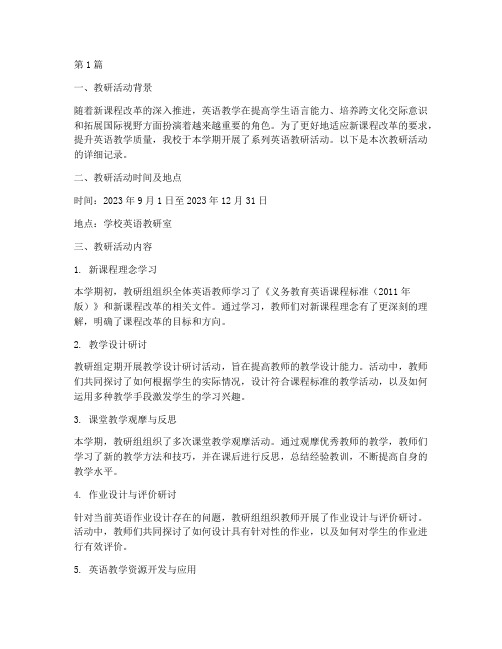
第1篇一、教研活动背景随着新课程改革的深入推进,英语教学在提高学生语言能力、培养跨文化交际意识和拓展国际视野方面扮演着越来越重要的角色。
为了更好地适应新课程改革的要求,提升英语教学质量,我校于本学期开展了系列英语教研活动。
以下是本次教研活动的详细记录。
二、教研活动时间及地点时间:2023年9月1日至2023年12月31日地点:学校英语教研室三、教研活动内容1. 新课程理念学习本学期初,教研组组织全体英语教师学习了《义务教育英语课程标准(2011年版)》和新课程改革的相关文件。
通过学习,教师们对新课程理念有了更深刻的理解,明确了课程改革的目标和方向。
2. 教学设计研讨教研组定期开展教学设计研讨活动,旨在提高教师的教学设计能力。
活动中,教师们共同探讨了如何根据学生的实际情况,设计符合课程标准的教学活动,以及如何运用多种教学手段激发学生的学习兴趣。
3. 课堂教学观摩与反思本学期,教研组组织了多次课堂教学观摩活动。
通过观摩优秀教师的教学,教师们学习了新的教学方法和技巧,并在课后进行反思,总结经验教训,不断提高自身的教学水平。
4. 作业设计与评价研讨针对当前英语作业设计存在的问题,教研组组织教师开展了作业设计与评价研讨。
活动中,教师们共同探讨了如何设计具有针对性的作业,以及如何对学生的作业进行有效评价。
5. 英语教学资源开发与应用为了丰富英语教学资源,提高教学效果,教研组鼓励教师积极参与教学资源开发。
活动中,教师们分享了各自收集到的优秀教学资源,并探讨了如何将这些资源应用于教学实践。
6. 英语教学评价方法研究为了更好地评价学生的英语学习成果,教研组组织教师开展了英语教学评价方法研究。
活动中,教师们探讨了如何运用多种评价方法,全面、客观地评价学生的英语学习。
四、教研活动成果1. 教师的教学理念得到了更新,对新课程改革有了更深入的理解。
2. 教师的教学设计能力得到了提升,能够根据学生的实际情况设计符合课程标准的教学活动。
初一英语教研活动记录三(3篇)

第1篇活动时间:2021年10月25日活动地点:学校多功能厅参与人员:初一英语组全体教师活动主题:探讨初中英语课堂有效教学策略一、活动背景随着新课程改革的不断深入,初中英语教学面临着新的挑战。
为了提高英语教学质量,促进教师专业成长,我校初一英语组于2021年10月25日开展了以“探讨初中英语课堂有效教学策略”为主题的教研活动。
本次活动旨在通过集体研讨,分享教学经验,共同探讨提高英语课堂效率的有效途径。
二、活动流程1. 集体备课活动伊始,由教研组长主持,组织全体英语教师进行集体备课。
首先,针对近期教学内容,每位教师分享了自己的教学设计和教学反思。
接着,大家围绕以下几个方面展开讨论:(1)如何激发学生的学习兴趣;(2)如何提高学生的英语听说能力;(3)如何培养学生的英语阅读习惯;(4)如何设计有效的课堂活动;(5)如何关注学生的个体差异,实施分层教学。
2. 分组讨论根据讨论内容,教研组将教师分为五个小组,分别就以上五个方面进行深入探讨。
每个小组推选一名代表,总结本组讨论成果,并分享给全体教师。
3. 经验交流各小组代表分别就讨论成果进行汇报,其他教师认真聆听并记录。
以下是各小组讨论成果的总结:(1)激发学生学习兴趣① 创设生动有趣的教学情境,让学生在轻松愉快的氛围中学习;② 运用多媒体技术,丰富教学内容,提高学生的学习兴趣;③ 鼓励学生参与课堂活动,培养学生的合作意识和团队精神。
(2)提高学生英语听说能力① 创设真实的语言环境,让学生在课堂上多听、多说;② 运用角色扮演、情景模拟等教学方法,提高学生的听说能力;③ 定期举办英语角、英语演讲比赛等活动,为学生提供展示自我的平台。
(3)培养学生英语阅读习惯① 鼓励学生广泛阅读,培养良好的阅读习惯;② 引导学生掌握阅读技巧,提高阅读速度和理解能力;③ 定期进行阅读测试,了解学生的阅读水平,针对性地进行指导。
(4)设计有效的课堂活动① 根据教学内容,设计富有创意的课堂活动,提高学生的参与度;② 注重课堂活动的层次性,满足不同学生的学习需求;③ 及时调整课堂活动,关注学生的反馈,确保活动效果。
英语初一教研活动记录本(3篇)
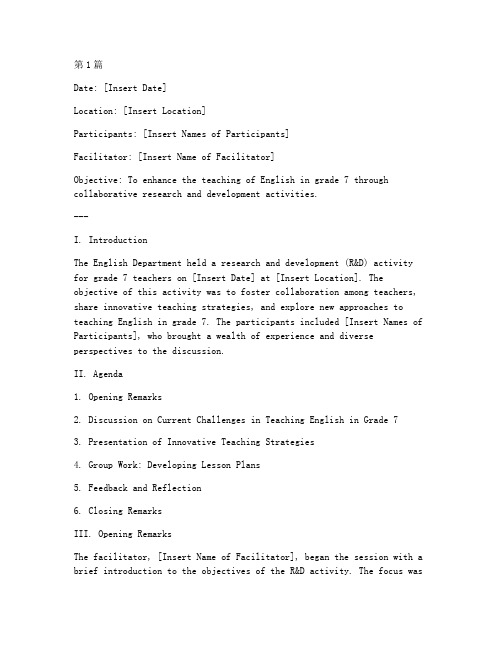
第1篇Date: [Insert Date]Location: [Insert Location]Participants: [Insert Names of Participants]Facilitator: [Insert Name of Facilitator]Objective: To enhance the teaching of English in grade 7 through collaborative research and development activities.---I. IntroductionThe English Department held a research and development (R&D) activity for grade 7 teachers on [Insert Date] at [Insert Location]. The objective of this activity was to foster collaboration among teachers, share innovative teaching strategies, and explore new approaches to teaching English in grade 7. The participants included [Insert Names of Participants], who brought a wealth of experience and diverse perspectives to the discussion.II. Agenda1. Opening Remarks2. Discussion on Current Challenges in Teaching English in Grade 73. Presentation of Innovative Teaching Strategies4. Group Work: Developing Lesson Plans5. Feedback and Reflection6. Closing RemarksIII. Opening RemarksThe facilitator, [Insert Name of Facilitator], began the session with a brief introduction to the objectives of the R&D activity. The focus wasto identify common challenges faced by grade 7 teachers and explore effective strategies to address these challenges. The facilitator emphasized the importance of collaboration and shared learning among teachers.IV. Discussion on Current Challenges in Teaching English in Grade 7The participants engaged in a lively discussion, sharing their experiences and insights into the challenges they faced while teaching English in grade 7. Some of the common challenges identified included:Lack of engagement among students: Many teachers reported that students often struggle to remain engaged during English classes, leading to lower participation rates and poor academic performance.Limited vocabulary knowledge: Students often lack a strong vocabulary base, making it difficult for them to understand and express themselves in English.Ineffective assessment methods: Traditional assessment methods, such as tests and quizzes, may not accurately reflect students' understanding of the subject.Teacher training and development: Many teachers felt that they needed more training and professional development opportunities to keep up with the latest teaching trends and techniques.V. Presentation of Innovative Teaching StrategiesTo address these challenges, the facilitator presented several innovative teaching strategies that could be implemented in grade 7 English classes. These strategies included:Flipped classrooms: In a flipped classroom, students watchinstructional videos at home and complete assignments in class, allowing teachers to focus on more interactive activities.Gamification: Incorporating games and gamified elements into lessons can make learning more engaging and enjoyable for students.Project-based learning: Assigning projects that require students to apply their knowledge in real-world contexts can help them develop critical thinking and problem-solving skills.Differentiated instruction: Tailoring instruction to meet theindividual needs of students can help ensure that all students are able to learn effectively.VI. Group Work: Developing Lesson PlansAfter the presentation, the participants were divided into small groups to develop lesson plans incorporating the innovative teaching strategies discussed. Each group was given a specific topic and tasked with creating a lesson plan that addressed the needs of grade 7 students.The groups worked diligently, sharing ideas and resources to create effective lesson plans. Some of the ideas generated included:A flipped classroom lesson on verb tenses: Students would watch instructional videos at home and complete practice exercises in class.A gamified lesson on vocabulary building: Students would participate in a vocabulary game, earning points and rewards for correct answers.A project-based learning activity on environmental issues: Students would research and present their findings on a specific environmental issue, using their English language skills to communicate their ideas.VII. Feedback and ReflectionOnce the lesson plans were completed, each group presented their work to the rest of the participants. The group received constructive feedback, which helped them refine their lesson plans further.The participants reflected on the R&D activity, discussing the value of collaboration and the potential benefits of the innovative teaching strategies discussed. Many expressed enthusiasm about implementing these strategies in their classrooms and shared their plans to collaborate with colleagues to further develop their teaching skills.VIII. Closing RemarksThe facilitator concluded the session by thanking the participants for their active participation and contributions. The R&D activity was a great success, and the participants left with new ideas and renewed enthusiasm for teaching English in grade 7.---IX. Next StepsImplement the developed lesson plans in classroomsShare the lesson plans with other grade 7 teachersConduct follow-up sessions to discuss the effectiveness of the strategiesSeek additional professional development opportunities to enhance teaching skillsThe English Department will continue to support grade 7 teachers in their efforts to provide a high-quality English education to their students. The R&D activity was a valuable step in this process, and the department looks forward to continuing to collaborate with teachers to improve teaching and learning outcomes.第2篇Date: [Insert Date]Location: [Insert Location]Participants: [Insert Names of Participants]Facilitator: [Insert Name of Facilitator]Objective: To discuss and improve the teaching methods for first-grade English and to enhance the students' learning experience.---I. IntroductionThe primary objective of today's research and teaching activity is to explore and enhance the teaching methods for first-grade English. As the facilitator, I welcome all participants to actively share their insights, experiences, and suggestions. The session aims to foster a collaborative environment where we can learn from each other and develop moreeffective strategies for our students.II. Warm-up ActivityTo begin, we engaged in a brief warm-up activity designed to stimulate creative thinking and open up discussions. Participants were asked to brainstorm different teaching methods that they have found successful in their classrooms. This activity allowed us to share a variety of approaches and set the stage for a productive session.III. Discussion on Current Teaching Practices1. Teaching Methodologies:- Group Discussion: Participants shared various teaching methodologies they have used, including the use of picture books, songs, and interactive games.- Feedback: The group agreed that these methods are effective in engaging students and making the learning process more enjoyable.2. Student Engagement:- Active Learning: One participant highlighted the importance ofactive learning, suggesting that students should be encouraged to participate in class discussions and group activities.- Motivation: Another participant emphasized the need to motivate students by setting achievable goals and providing positive reinforcement.3. Assessment Techniques:- Formative Assessment: The group discussed the use of formative assessments, such as quizzes and class discussions, to monitor student progress and adjust teaching strategies accordingly.- Homework Assignments: There was a consensus that homework assignments should be purposeful and relevant to the classroom learning.IV. Case Study AnalysisWe then delved into a case study of a first-grade English class that faced challenges in student engagement. Participants were divided into small groups to analyze the case and propose solutions.- Group 1: Suggested incorporating more interactive activities, such as role-playing and storytelling, to make the lessons more engaging.- Group 2: Proposed using technology, such as educational apps and online resources, to cater to different learning styles.- Group 3: Recommended implementing a buddy system to encourage peer learning and support.V. Implementation and Follow-up1. Action Plan:- Each participant committed to implementing at least one new teaching strategy in their classroom.- A follow-up meeting was scheduled to discuss the outcomes and share experiences.2. Professional Development:- Participants agreed to attend a workshop on "Engaging First-Grade English Learners" to further enhance their teaching skills.- A resource library was established to share educational materials and resources.VI. ConclusionToday's research and teaching activity has been incredibly fruitful. We have explored various teaching methods, discussed effective strategies for student engagement, and analyzed a case study to propose practical solutions. The collaborative spirit and willingness to learn from eachother have been evident throughout the session. I am confident that the new strategies and resources discussed today will greatly enhance the learning experience for our first-grade English students.VII. Action Items- Facilitator: Prepare a summary of the session and distribute it to participants.- Participants: Implement new teaching strategies and share their experiences in the next follow-up meeting.- All: Continue to support and encourage each other in our professional development journey.---End of Record[Facilitator's Signature][Date]---This record captures the essence of a typical English初一教研活动, focusing on collaborative learning, method exploration, and practical implementation strategies.第3篇日期:2023年4月15日地点:学校多功能厅参与人员:初一英语教研组全体成员主持人:张老师记录人:李老师一、活动背景为了提高初一英语教学质量,提升教师教学水平,我校初一英语教研组于2023年4月15日开展了主题为“初中英语教学策略探讨”的教研活动。
初中学英语教研活动记录(3篇)
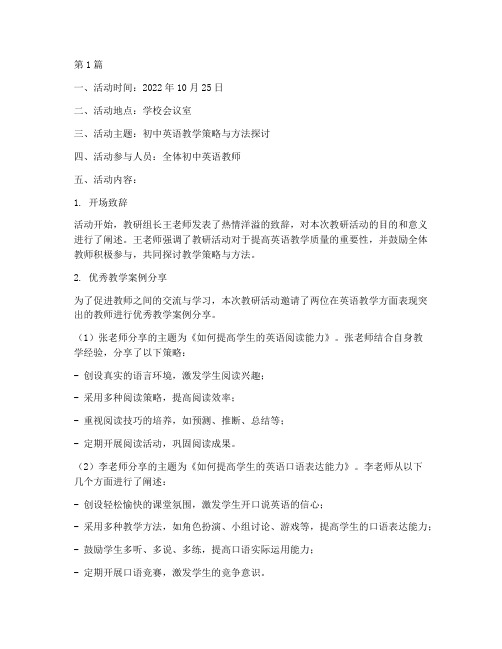
第1篇一、活动时间:2022年10月25日二、活动地点:学校会议室三、活动主题:初中英语教学策略与方法探讨四、活动参与人员:全体初中英语教师五、活动内容:1. 开场致辞活动开始,教研组长王老师发表了热情洋溢的致辞,对本次教研活动的目的和意义进行了阐述。
王老师强调了教研活动对于提高英语教学质量的重要性,并鼓励全体教师积极参与,共同探讨教学策略与方法。
2. 优秀教学案例分享为了促进教师之间的交流与学习,本次教研活动邀请了两位在英语教学方面表现突出的教师进行优秀教学案例分享。
(1)张老师分享的主题为《如何提高学生的英语阅读能力》。
张老师结合自身教学经验,分享了以下策略:- 创设真实的语言环境,激发学生阅读兴趣;- 采用多种阅读策略,提高阅读效率;- 重视阅读技巧的培养,如预测、推断、总结等;- 定期开展阅读活动,巩固阅读成果。
(2)李老师分享的主题为《如何提高学生的英语口语表达能力》。
李老师从以下几个方面进行了阐述:- 创设轻松愉快的课堂氛围,激发学生开口说英语的信心;- 采用多种教学方法,如角色扮演、小组讨论、游戏等,提高学生的口语表达能力;- 鼓励学生多听、多说、多练,提高口语实际运用能力;- 定期开展口语竞赛,激发学生的竞争意识。
3. 教学策略与方法讨论在优秀教学案例分享的基础上,全体教师围绕以下话题进行了热烈的讨论:(1)如何提高学生的英语听力能力?(2)如何培养学生的英语写作能力?(3)如何运用信息技术辅助英语教学?(4)如何加强英语课堂的趣味性?讨论过程中,教师们各抒己见,分享了自己的教学心得和经验。
以下是一些具有代表性的观点:- 提高听力能力的关键在于多听、多模仿,教师可以为学生提供丰富的听力材料,如英语歌曲、电影、新闻等;- 培养学生的写作能力,首先要让他们了解写作的基本结构和技巧,然后通过大量的写作练习,提高写作水平;- 信息技术在英语教学中的应用可以丰富教学内容,提高教学效果,如利用多媒体课件、网络资源等;- 加强英语课堂的趣味性,可以通过游戏、歌曲、角色扮演等多种形式,激发学生的学习兴趣。
七年级教研活动记录英语(3篇)
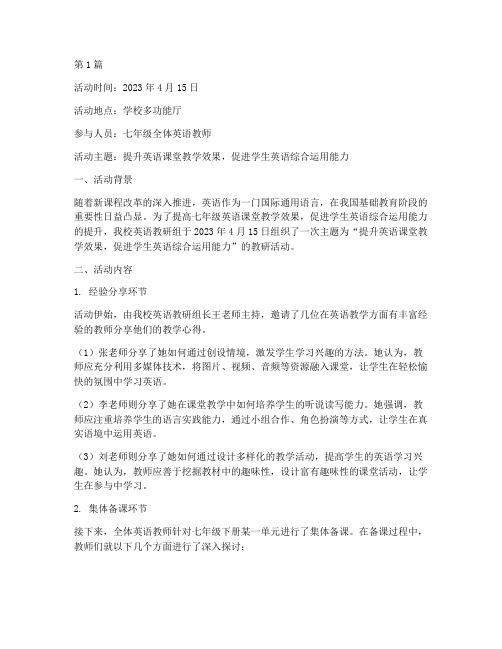
第1篇活动时间:2023年4月15日活动地点:学校多功能厅参与人员:七年级全体英语教师活动主题:提升英语课堂教学效果,促进学生英语综合运用能力一、活动背景随着新课程改革的深入推进,英语作为一门国际通用语言,在我国基础教育阶段的重要性日益凸显。
为了提高七年级英语课堂教学效果,促进学生英语综合运用能力的提升,我校英语教研组于2023年4月15日组织了一次主题为“提升英语课堂教学效果,促进学生英语综合运用能力”的教研活动。
二、活动内容1. 经验分享环节活动伊始,由我校英语教研组长王老师主持,邀请了几位在英语教学方面有丰富经验的教师分享他们的教学心得。
(1)张老师分享了她如何通过创设情境,激发学生学习兴趣的方法。
她认为,教师应充分利用多媒体技术,将图片、视频、音频等资源融入课堂,让学生在轻松愉快的氛围中学习英语。
(2)李老师则分享了她在课堂教学中如何培养学生的听说读写能力。
她强调,教师应注重培养学生的语言实践能力,通过小组合作、角色扮演等方式,让学生在真实语境中运用英语。
(3)刘老师则分享了她如何通过设计多样化的教学活动,提高学生的英语学习兴趣。
她认为,教师应善于挖掘教材中的趣味性,设计富有趣味性的课堂活动,让学生在参与中学习。
2. 集体备课环节接下来,全体英语教师针对七年级下册某一单元进行了集体备课。
在备课过程中,教师们就以下几个方面进行了深入探讨:(1)教材分析:教师们共同分析了该单元的教学目标、重难点,以及教材内容的特点。
(2)教学设计:教师们结合自身教学风格,提出了多种教学设计方案,并就设计方案进行了比较和筛选。
(3)教学方法:教师们就如何运用多种教学方法,提高课堂教学效果进行了讨论。
3. 课堂观摩环节为了进一步探讨课堂教学效果,教研组安排了一节公开课。
由经验丰富的李老师执教,全体英语教师观摩了该节课。
课后,教研组组织了评课活动,教师们就以下几个方面进行了点评:(1)教学目标达成情况:教师们认为,李老师的教学目标明确,教学过程紧凑,学生参与度高,教学目标基本达成。
初一英语下教研活动记录(3篇)
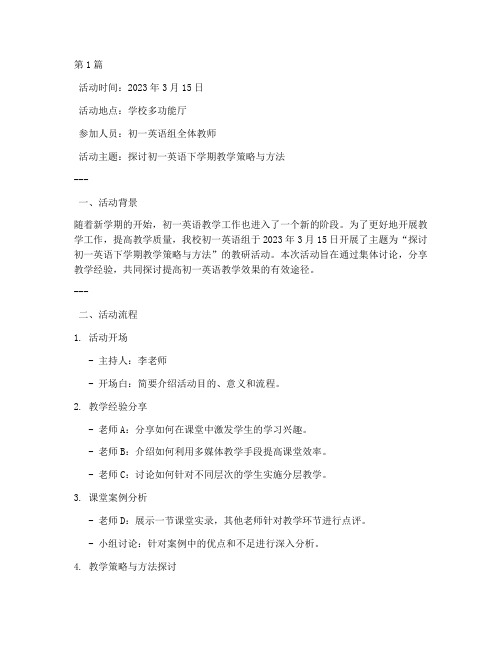
第1篇活动时间:2023年3月15日活动地点:学校多功能厅参加人员:初一英语组全体教师活动主题:探讨初一英语下学期教学策略与方法---一、活动背景随着新学期的开始,初一英语教学工作也进入了一个新的阶段。
为了更好地开展教学工作,提高教学质量,我校初一英语组于2023年3月15日开展了主题为“探讨初一英语下学期教学策略与方法”的教研活动。
本次活动旨在通过集体讨论,分享教学经验,共同探讨提高初一英语教学效果的有效途径。
---二、活动流程1. 活动开场- 主持人:李老师- 开场白:简要介绍活动目的、意义和流程。
2. 教学经验分享- 老师A:分享如何在课堂中激发学生的学习兴趣。
- 老师B:介绍如何利用多媒体教学手段提高课堂效率。
- 老师C:讨论如何针对不同层次的学生实施分层教学。
3. 课堂案例分析- 老师D:展示一节课堂实录,其他老师针对教学环节进行点评。
- 小组讨论:针对案例中的优点和不足进行深入分析。
4. 教学策略与方法探讨- 小组讨论:各小组就如何提高学生英语阅读、写作、听力等能力进行讨论。
- 代表发言:各小组选派代表进行总结发言。
5. 总结与反思- 组长总结:对本次活动进行总结,提出改进建议。
- 教研组长:对本次活动进行点评,并对下阶段工作进行部署。
---三、活动内容1. 教学经验分享老师A在分享时提到,激发学生学习兴趣的关键在于关注学生的个体差异,采用多种教学手段,如游戏、歌曲、故事等,使课堂氛围活跃,提高学生的学习积极性。
老师B则强调多媒体教学的重要性,认为通过图片、视频、音频等多媒体资源,可以使教学内容更加生动形象,提高学生的学习效果。
老师C在分层教学方面提出了自己的看法,认为要根据学生的英语水平,将学生分为A、B、C三个层次,针对不同层次的学生制定相应的教学目标和教学策略。
2. 课堂案例分析老师D展示的课堂实录中,教师通过提问、小组讨论、角色扮演等多种形式,引导学生积极参与课堂活动。
其他老师针对此案例进行了点评,认为教师的教学设计合理,课堂氛围活跃,学生的参与度高。
初一教研英语活动记录(3篇)
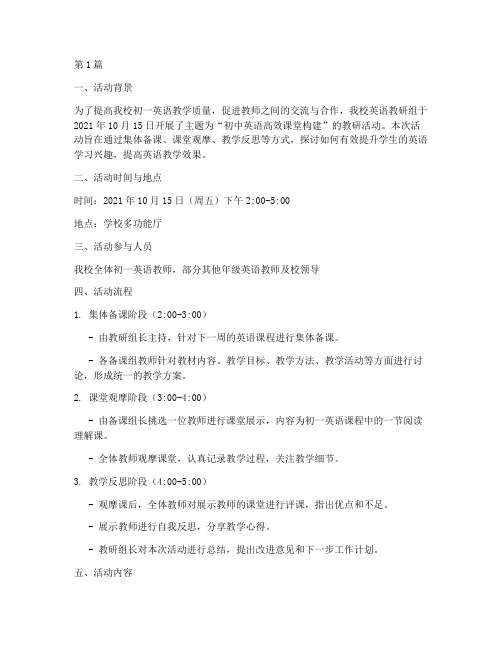
第1篇一、活动背景为了提高我校初一英语教学质量,促进教师之间的交流与合作,我校英语教研组于2021年10月15日开展了主题为“初中英语高效课堂构建”的教研活动。
本次活动旨在通过集体备课、课堂观摩、教学反思等方式,探讨如何有效提升学生的英语学习兴趣,提高英语教学效果。
二、活动时间与地点时间:2021年10月15日(周五)下午2:00-5:00地点:学校多功能厅三、活动参与人员我校全体初一英语教师,部分其他年级英语教师及校领导四、活动流程1. 集体备课阶段(2:00-3:00)- 由教研组长主持,针对下一周的英语课程进行集体备课。
- 各备课组教师针对教材内容、教学目标、教学方法、教学活动等方面进行讨论,形成统一的教学方案。
2. 课堂观摩阶段(3:00-4:00)- 由备课组长挑选一位教师进行课堂展示,内容为初一英语课程中的一节阅读理解课。
- 全体教师观摩课堂,认真记录教学过程,关注教学细节。
3. 教学反思阶段(4:00-5:00)- 观摩课后,全体教师对展示教师的课堂进行评课,指出优点和不足。
- 展示教师进行自我反思,分享教学心得。
- 教研组长对本次活动进行总结,提出改进意见和下一步工作计划。
五、活动内容1. 集体备课- 针对教材内容,教师们共同分析了学生的英语学习特点,讨论了如何根据学生的实际情况调整教学策略。
- 教师们分享了各自的教学经验,如如何激发学生的学习兴趣,如何提高学生的英语听说读写能力等。
2. 课堂观摩- 展示教师通过创设情境、小组合作、游戏竞赛等多种教学手段,引导学生积极参与课堂活动,提高了学生的学习效率。
- 教师注重学生的个体差异,针对不同层次的学生进行分层教学,使每个学生都能在课堂上有所收获。
3. 教学反思- 观摩课后,教师们针对展示教师的课堂进行了深入的讨论,肯定了其教学亮点,如课堂氛围活跃、学生参与度高、教学目标明确等。
- 同时,也指出了不足之处,如个别环节时间把握不够准确、部分学生参与度不高、教学评价方式单一等。
七年级英语教研活动记载(3篇)
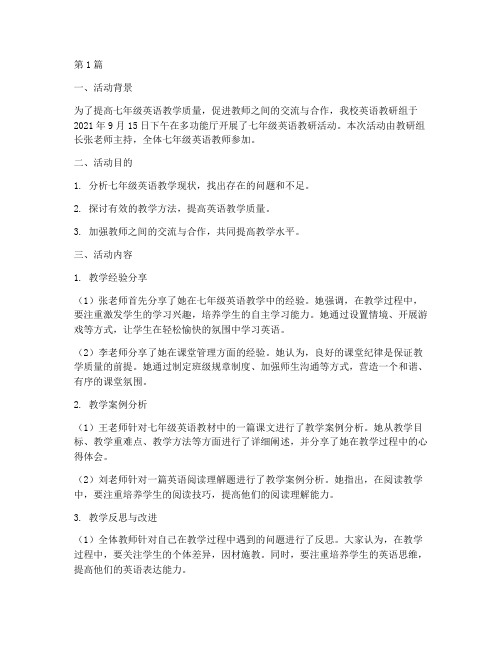
第1篇一、活动背景为了提高七年级英语教学质量,促进教师之间的交流与合作,我校英语教研组于2021年9月15日下午在多功能厅开展了七年级英语教研活动。
本次活动由教研组长张老师主持,全体七年级英语教师参加。
二、活动目的1. 分析七年级英语教学现状,找出存在的问题和不足。
2. 探讨有效的教学方法,提高英语教学质量。
3. 加强教师之间的交流与合作,共同提高教学水平。
三、活动内容1. 教学经验分享(1)张老师首先分享了她在七年级英语教学中的经验。
她强调,在教学过程中,要注重激发学生的学习兴趣,培养学生的自主学习能力。
她通过设置情境、开展游戏等方式,让学生在轻松愉快的氛围中学习英语。
(2)李老师分享了她在课堂管理方面的经验。
她认为,良好的课堂纪律是保证教学质量的前提。
她通过制定班级规章制度、加强师生沟通等方式,营造一个和谐、有序的课堂氛围。
2. 教学案例分析(1)王老师针对七年级英语教材中的一篇课文进行了教学案例分析。
她从教学目标、教学重难点、教学方法等方面进行了详细阐述,并分享了她在教学过程中的心得体会。
(2)刘老师针对一篇英语阅读理解题进行了教学案例分析。
她指出,在阅读教学中,要注重培养学生的阅读技巧,提高他们的阅读理解能力。
3. 教学反思与改进(1)全体教师针对自己在教学过程中遇到的问题进行了反思。
大家认为,在教学过程中,要关注学生的个体差异,因材施教。
同时,要注重培养学生的英语思维,提高他们的英语表达能力。
(2)针对存在的问题,教师们提出了相应的改进措施。
如:加强课堂互动,提高学生的参与度;优化教学设计,提高教学效果;关注学生的情感需求,营造良好的学习氛围等。
4. 教学资源分享(1)张老师分享了她在网上找到的一些优质英语教学资源,如:英语学习网站、英语教学软件等。
这些资源可以帮助教师更好地开展教学活动。
(2)李老师分享了她在教学中积累的一些教学经验,如:如何设计课堂活动、如何处理课堂突发事件等。
四、活动总结本次教研活动取得了圆满成功。
七年级英语教研记录(3篇)

第1篇日期:2023年4月10日地点:学校会议室参与人员:七年级英语教研组全体成员主持人:张老师记录人:李老师---一、教研活动背景随着新学期的开始,七年级英语教学工作也逐步展开。
为了提高英语教学质量,促进教师之间的交流与合作,我校七年级英语教研组于2023年4月10日开展了本学期第一次教研活动。
本次教研活动旨在分析当前教学现状,探讨教学方法,解决教学中的实际问题。
---二、教研活动内容1. 分析教学现状张老师首先对上学期七年级英语教学的整体情况进行了分析,指出在教学过程中存在的问题,如部分学生学习兴趣不高,基础薄弱,课堂参与度低等。
2. 交流教学方法随后,教研组全体成员就教学方法进行了深入交流。
以下是几位老师的发言摘要:王老师:针对学生学习兴趣不高的问题,我尝试将游戏、歌曲等元素融入课堂,激发学生的学习兴趣。
刘老师:为了提高学生的课堂参与度,我经常设计一些小组讨论和角色扮演活动,让学生在互动中学习。
赵老师:针对基础薄弱的学生,我利用课后时间进行个别辅导,帮助他们弥补知识漏洞。
3. 探讨教学策略在交流教学方法的基础上,教研组全体成员共同探讨了以下教学策略:加强课堂管理:建立良好的课堂纪律,提高学生的课堂注意力。
关注个体差异:针对不同学生的学习需求,采取分层教学策略。
提高课堂效率:优化教学设计,合理分配教学时间,提高课堂效率。
加强家校合作:与家长保持密切沟通,共同关注学生的学习进步。
4. 分享教学资源为了更好地开展教学工作,教研组全体成员分享了以下教学资源:在线英语学习平台:如“英语流利说”、“百词斩”等,帮助学生进行自主学习和复习。
英语学习APP:如“扇贝单词”、“墨墨背单词”等,帮助学生巩固词汇和语法知识。
英语学习网站:如“BBC Learning English”、“VOA Learning English”等,提供丰富的英语学习资源。
---三、教研活动总结本次教研活动取得了圆满成功。
通过交流教学方法、探讨教学策略和分享教学资源,全体成员对今后的教学工作有了更加明确的方向。
七年级英语组内教研记录(3篇)

第1篇一、会议时间:2021年9月15日二、会议地点:七年级英语办公室三、参会人员:七年级全体英语教师四、会议主题:探讨七年级英语教学策略,提高教学质量五、会议内容:1. 分析七年级英语教学现状(1)学生基础参差不齐,部分学生英语学习兴趣不高,学习积极性不足。
(2)教师教学方法单一,缺乏创新,导致学生学习效果不佳。
(3)教学资源不足,教师无法充分利用网络、多媒体等教学手段。
2. 探讨提高七年级英语教学质量的策略(1)加强学生英语学习兴趣的培养教师应注重激发学生的英语学习兴趣,通过丰富多彩的教学活动,让学生在轻松愉快的氛围中学习英语。
例如,开展英语角、英语歌曲比赛、英语演讲比赛等活动,提高学生学习英语的积极性。
(2)优化教学方法,提高教学效果教师应创新教学方法,运用多种教学手段,如情景教学、任务型教学、合作学习等,提高学生的学习效果。
同时,关注学生的个体差异,针对不同层次的学生进行分层教学,使每个学生都能在英语学习中取得进步。
(3)充分利用教学资源,提高教学质量教师应充分利用网络、多媒体等教学资源,丰富教学内容,提高教学效果。
例如,利用网络资源制作课件,开展线上教学,提高学生的学习兴趣;利用多媒体设备播放英语电影、歌曲等,让学生在欣赏的同时学习英语。
(4)加强教师之间的合作与交流教师应加强团队合作,相互学习、借鉴优秀的教学经验,共同提高教学质量。
定期开展组内教研活动,分享教学心得,共同解决教学难题。
3. 教师个人教学反思与改进措施(1)针对学生基础参差不齐的问题,教师应注重分层教学,关注学生的个体差异,使每个学生都能在英语学习中取得进步。
(2)改进教学方法,运用多种教学手段,激发学生的学习兴趣,提高教学效果。
(3)加强自身专业素养的提升,关注教育前沿动态,不断学习新的教学理念和方法。
4. 教学计划与安排(1)制定详细的教学计划,明确教学目标、教学内容、教学方法等。
(2)合理安排课堂教学时间,保证教学质量。
七年级英语复习教研记录(3篇)
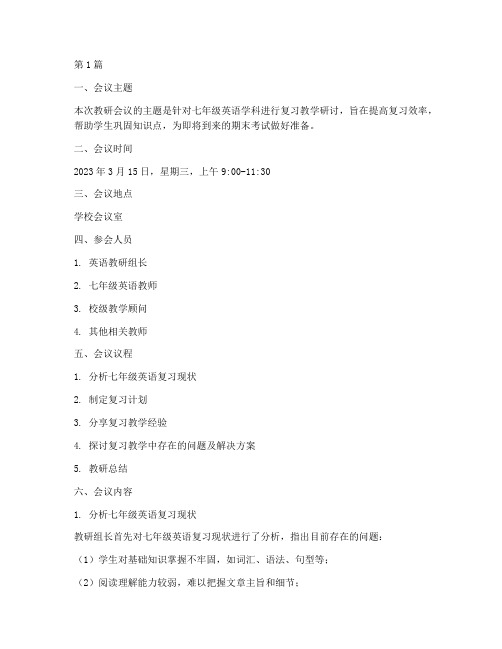
第1篇一、会议主题本次教研会议的主题是针对七年级英语学科进行复习教学研讨,旨在提高复习效率,帮助学生巩固知识点,为即将到来的期末考试做好准备。
二、会议时间2023年3月15日,星期三,上午9:00-11:30三、会议地点学校会议室四、参会人员1. 英语教研组长2. 七年级英语教师3. 校级教学顾问4. 其他相关教师五、会议议程1. 分析七年级英语复习现状2. 制定复习计划3. 分享复习教学经验4. 探讨复习教学中存在的问题及解决方案5. 教研总结六、会议内容1. 分析七年级英语复习现状教研组长首先对七年级英语复习现状进行了分析,指出目前存在的问题:(1)学生对基础知识掌握不牢固,如词汇、语法、句型等;(2)阅读理解能力较弱,难以把握文章主旨和细节;(3)写作能力不足,语言表达不够准确、流畅;(4)课堂复习效率不高,部分学生参与度低。
2. 制定复习计划针对以上问题,教研组制定了以下复习计划:(1)加强基础知识复习,通过课堂讲解、课后作业等形式,帮助学生巩固词汇、语法、句型等知识点;(2)提高阅读理解能力,通过阅读不同类型的文章,培养学生的阅读技巧和策略;(3)加强写作训练,指导学生运用所学知识进行写作,提高语言表达能力;(4)优化课堂复习,提高学生参与度,如采用小组讨论、游戏等方式,激发学生的学习兴趣。
3. 分享复习教学经验在会议的第二阶段,几位经验丰富的英语教师分享了他们的复习教学经验:(1)教师A:注重课堂互动,通过提问、讨论等方式,引导学生积极参与课堂;(2)教师B:采用多媒体教学手段,如图片、视频等,提高学生的学习兴趣;(3)教师C:针对不同层次的学生,制定个性化复习计划,关注学生的学习需求;(4)教师D:注重培养学生的自主学习能力,鼓励学生利用课余时间进行复习。
4. 探讨复习教学中存在的问题及解决方案在会议的第三阶段,参会教师针对复习教学中存在的问题进行了探讨,并提出以下解决方案:(1)针对基础知识掌握不牢固的学生,教师可以采用分层教学,针对不同层次的学生制定不同的复习计划;(2)提高阅读理解能力,教师可以引导学生关注文章结构、段落大意、关键词等,培养学生的阅读技巧;(3)加强写作训练,教师可以提供范文,让学生进行仿写、改写等练习,提高写作水平;(4)优化课堂复习,教师可以采用多种教学手段,如小组合作、角色扮演等,提高学生的参与度。
七年级英语上册教研记录(3篇)
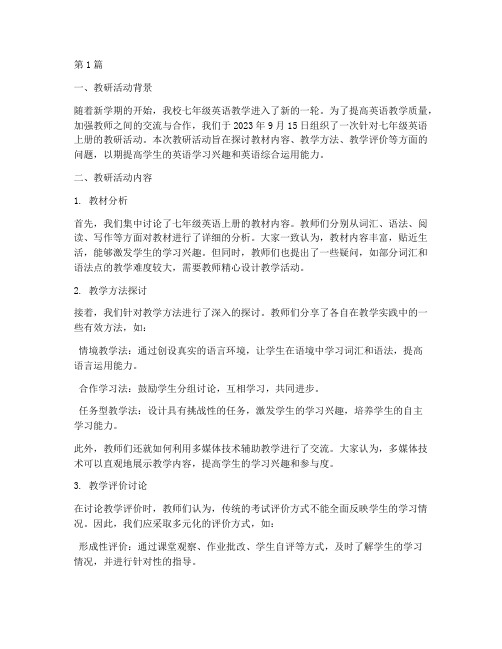
第1篇一、教研活动背景随着新学期的开始,我校七年级英语教学进入了新的一轮。
为了提高英语教学质量,加强教师之间的交流与合作,我们于2023年9月15日组织了一次针对七年级英语上册的教研活动。
本次教研活动旨在探讨教材内容、教学方法、教学评价等方面的问题,以期提高学生的英语学习兴趣和英语综合运用能力。
二、教研活动内容1. 教材分析首先,我们集中讨论了七年级英语上册的教材内容。
教师们分别从词汇、语法、阅读、写作等方面对教材进行了详细的分析。
大家一致认为,教材内容丰富,贴近生活,能够激发学生的学习兴趣。
但同时,教师们也提出了一些疑问,如部分词汇和语法点的教学难度较大,需要教师精心设计教学活动。
2. 教学方法探讨接着,我们针对教学方法进行了深入的探讨。
教师们分享了各自在教学实践中的一些有效方法,如:情境教学法:通过创设真实的语言环境,让学生在语境中学习词汇和语法,提高语言运用能力。
合作学习法:鼓励学生分组讨论,互相学习,共同进步。
任务型教学法:设计具有挑战性的任务,激发学生的学习兴趣,培养学生的自主学习能力。
此外,教师们还就如何利用多媒体技术辅助教学进行了交流。
大家认为,多媒体技术可以直观地展示教学内容,提高学生的学习兴趣和参与度。
3. 教学评价讨论在讨论教学评价时,教师们认为,传统的考试评价方式不能全面反映学生的学习情况。
因此,我们应采取多元化的评价方式,如:形成性评价:通过课堂观察、作业批改、学生自评等方式,及时了解学生的学习情况,并进行针对性的指导。
过程性评价:关注学生的学习过程,评价学生的参与度、合作能力、创新思维等。
终结性评价:通过考试等方式,对学生的学习成果进行综合评价。
4. 教学资源分享最后,教师们分享了各自收集到的教学资源,如优质课件、教学视频、练习题等。
大家表示,将积极利用这些资源,丰富教学内容,提高教学效果。
三、教研活动总结本次教研活动取得了圆满成功。
通过讨论,教师们对七年级英语上册的教学有了更深入的了解,并明确了今后的教学方向。
初一英语_教研记录(3篇)

第1篇日期:2023年4月15日地点:学校多功能厅参与人员:英语教研组全体成员主持人:张丽老师记录人:李明老师---一、会议主题本次教研会议的主题是“探讨初一英语教学策略,提高学生英语学习兴趣和成绩”。
二、会议议程1. 教学经验分享2. 学生英语学习现状分析3. 教学策略讨论4. 课堂活动设计5. 总结与展望---三、会议内容(一)教学经验分享张丽老师首先分享了她在初一英语教学中的成功经验。
她强调了以下几点:1. 激发学生学习兴趣:通过引入有趣的教材和活动,激发学生的学习兴趣。
2. 注重基础教学:从字母、单词到语法,逐步帮助学生打好基础。
3. 课堂互动:鼓励学生积极参与课堂讨论,提高学生的口语表达能力。
4. 分层教学:针对不同学生的学习水平,进行差异化教学。
(二)学生英语学习现状分析李明老师对学生的英语学习现状进行了分析:1. 基础知识薄弱:部分学生对字母、单词、语法等基础知识掌握不牢固。
2. 学习兴趣不高:部分学生对英语学习缺乏兴趣,学习积极性不高。
3. 口语表达能力不足:学生在口语表达方面存在一定困难。
(三)教学策略讨论针对学生英语学习现状,教研组成员展开了热烈的讨论,提出了以下教学策略:1. 趣味教学:通过游戏、歌曲、视频等多种形式,提高学生的学习兴趣。
2. 情景教学:结合实际生活,创设真实的语言环境,提高学生的实际应用能力。
3. 合作学习:组织小组讨论、角色扮演等活动,培养学生的合作意识和团队精神。
4. 分层教学:针对不同学生的学习水平,设计不同难度的教学任务,满足学生的个性化需求。
5. 家校合作:加强家校沟通,共同关注学生的英语学习情况。
(四)课堂活动设计教研组成员共同设计了以下课堂活动:1. 单词接龙:通过接龙游戏,巩固学生的单词记忆。
2. 情景对话:结合教材内容,设计情景对话,提高学生的口语表达能力。
3. 小组竞赛:将学生分成小组,进行小组竞赛,激发学生的学习积极性。
4. 英语角:定期组织英语角活动,为学生提供英语交流的平台。
初一英语教研会议记录(3篇)

第1篇会议时间:2023年4月15日上午9:00-11:30会议地点:学校多功能厅出席人员:初一英语教研组全体教师记录人:张丽---一、会议主题本次教研会议的主题是“探讨初一英语教学策略,提升学生英语学习兴趣和成绩”。
二、会议议程1. 总结上学期英语教学情况2. 讨论本学期教学目标和计划3. 分享优秀教学案例和经验4. 分析学生英语学习中的常见问题及解决策略5. 讨论如何提升学生英语学习兴趣6. 分组讨论和交流7. 会议总结---三、会议内容1. 总结上学期英语教学情况张老师首先对上学期英语教学情况进行了总结。
她指出,学生在词汇、语法和阅读理解方面取得了一定的进步,但在口语表达和写作能力上还有待提高。
同时,部分学生英语学习兴趣不高,影响了整体教学效果。
2. 讨论本学期教学目标和计划针对上学期的问题,教研组讨论并制定了本学期的教学目标和计划。
目标是提高学生的英语综合运用能力,激发学生的学习兴趣,确保所有学生都能在英语学习中取得进步。
本学期的教学计划包括:- 每周安排两次口语练习,提高学生的口语表达能力。
- 定期组织写作活动,培养学生的写作技巧。
- 通过阅读不同类型的文章,提升学生的阅读理解能力。
- 结合教材内容,设计丰富多样的课堂活动,提高学生的学习兴趣。
3. 分享优秀教学案例和经验李老师分享了一个关于如何提高学生词汇记忆效率的教学案例。
她通过设计游戏、小组竞赛等形式,让学生在轻松愉快的氛围中学习词汇,取得了良好的效果。
4. 分析学生英语学习中的常见问题及解决策略教研组针对学生英语学习中的常见问题进行了深入分析,并提出了相应的解决策略:- 对于词汇记忆困难的学生,可以采用联想记忆法、卡片记忆法等方法。
- 对于语法理解不清的学生,可以通过讲解、练习和实际运用来加强理解。
- 对于阅读理解能力较弱的学生,可以通过阅读不同类型的文章,提高阅读速度和理解能力。
5. 讨论如何提升学生英语学习兴趣提升学生英语学习兴趣是本次会议的重点讨论内容。
初一英语教研活动记录(3篇)

第1篇活动时间:2023年10月26日活动地点:初中部英语组办公室参与人员:初中部全体英语教师活动主题:探讨初一英语教学策略,提高学生英语学习兴趣和效果一、活动背景随着新学期的开始,初一英语教学面临着新的挑战和机遇。
为了更好地适应学生的需求,提高英语教学质量,我校初中部英语组决定开展一次主题为“探讨初一英语教学策略,提高学生英语学习兴趣和效果”的教研活动。
二、活动流程1. 开场致辞活动开始,由教研组长张老师致辞,强调了本次教研活动的重要性和目的,希望全体教师积极参与,共同探讨提高初一英语教学效果的方法。
2. 经验分享邀请了三位在初一英语教学方面有丰富经验的教师进行经验分享。
以下是他们的分享要点:- 教师A:分享了如何利用多媒体教学手段激发学生学习兴趣的方法。
她认为,通过图片、视频、音频等多种形式,可以使英语课堂更加生动有趣,提高学生的学习积极性。
- 教师B:重点介绍了如何通过创设情境,让学生在真实的语境中学习英语。
她提出,教师应该根据教材内容,设计贴近学生生活的情境,让学生在情境中自然地运用英语。
- 教师C:分享了如何关注学生个体差异,实施分层教学的方法。
她认为,教师应该根据学生的英语水平,将学生分成不同层次,针对不同层次的学生制定不同的教学目标和教学方法。
3. 分组讨论全体教师分成四个小组,针对以下问题进行讨论:- 如何在课堂上激发学生的学习兴趣?- 如何提高学生的英语听说能力?- 如何培养学生的英语写作能力?- 如何关注学生的个体差异,实施分层教学?各小组在讨论过程中,积极发言,分享自己的教学经验和心得。
经过激烈的讨论,各小组分别提出了以下建议:- 激发学习兴趣:通过游戏、竞赛、角色扮演等多种形式,让学生在轻松愉快的氛围中学习英语。
- 提高听说能力:利用英语角、口语课等形式,为学生提供更多的英语口语练习机会。
- 培养写作能力:通过仿写、改写、续写等方式,提高学生的英语写作能力。
- 分层教学:根据学生的英语水平,制定不同的教学目标和教学方法,让每个学生都能在课堂上有所收获。
仁爱七年级英语教研记录(3篇)

第1篇时间:2023年4月15日地点:仁爱中学七年级英语备课室参与人员:全体七年级英语教师主持人:张老师记录人:李老师一、会议主题本次教研会议的主题是“探讨七年级英语教学策略,提高学生英语学习兴趣和效果”。
二、会议议程1. 回顾上学期教学情况2. 分析当前学生英语学习现状3. 讨论提高学生英语学习兴趣的策略4. 分享教学经验与心得5. 制定本学期教学计划三、会议内容1. 回顾上学期教学情况张老师首先回顾了上学期七年级英语的教学情况。
他指出,在上学期教学中,我们取得了一定的成绩,但也存在一些问题,如部分学生英语基础薄弱,学习兴趣不高,课堂参与度不够等。
2. 分析当前学生英语学习现状接着,各教师针对学生英语学习现状进行了分析。
李老师提到,目前七年级学生正处于青春期,对新鲜事物充满好奇,但同时也面临着学习压力。
英语作为一门语言学科,需要学生不断积累词汇、语法知识,这对于基础薄弱的学生来说是一个挑战。
3. 讨论提高学生英语学习兴趣的策略在讨论环节,教师们纷纷提出了提高学生英语学习兴趣的策略。
(1)张老师建议,可以通过多媒体教学手段,如视频、音频、图片等,激发学生的学习兴趣。
(2)李老师提出,开展英语角活动,让学生在轻松愉快的氛围中学习英语。
(3)王老师建议,定期举办英语演讲比赛、英语歌曲比赛等活动,提高学生的口语表达能力。
(4)刘老师认为,教师应关注学生的个体差异,针对不同学生的学习需求,制定个性化的教学方案。
4. 分享教学经验与心得在分享环节,教师们纷纷分享了各自的教学经验与心得。
(1)赵老师分享了如何利用小组合作学习提高学生课堂参与度的方法。
(2)孙老师分享了如何通过创设情境,让学生在情境中学习英语的经验。
(3)周老师分享了如何利用游戏教学,提高学生学习兴趣的方法。
5. 制定本学期教学计划最后,张老师带领大家制定了本学期教学计划。
主要内容包括:(1)加强基础知识教学,提高学生的英语水平。
(2)注重培养学生的听说读写能力,提高学生的英语综合运用能力。
七下英语教研记录(3篇)
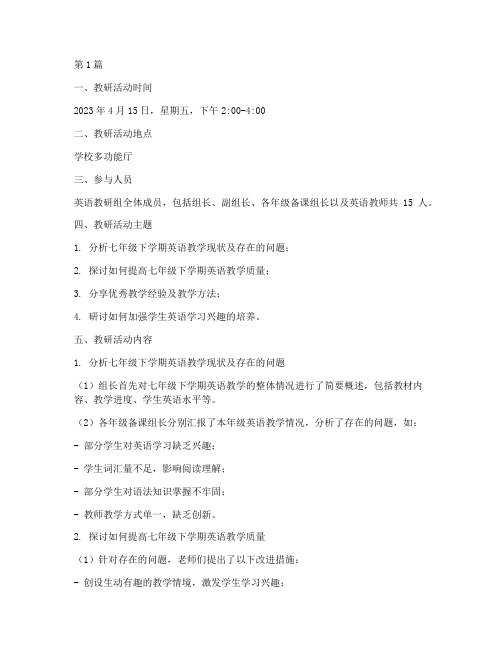
第1篇一、教研活动时间2023年4月15日,星期五,下午2:00-4:00二、教研活动地点学校多功能厅三、参与人员英语教研组全体成员,包括组长、副组长、各年级备课组长以及英语教师共15人。
四、教研活动主题1. 分析七年级下学期英语教学现状及存在的问题;2. 探讨如何提高七年级下学期英语教学质量;3. 分享优秀教学经验及教学方法;4. 研讨如何加强学生英语学习兴趣的培养。
五、教研活动内容1. 分析七年级下学期英语教学现状及存在的问题(1)组长首先对七年级下学期英语教学的整体情况进行了简要概述,包括教材内容、教学进度、学生英语水平等。
(2)各年级备课组长分别汇报了本年级英语教学情况,分析了存在的问题,如:- 部分学生对英语学习缺乏兴趣;- 学生词汇量不足,影响阅读理解;- 部分学生对语法知识掌握不牢固;- 教师教学方式单一,缺乏创新。
2. 探讨如何提高七年级下学期英语教学质量(1)针对存在的问题,老师们提出了以下改进措施:- 创设生动有趣的教学情境,激发学生学习兴趣;- 加强词汇教学,引导学生运用多种方法记忆单词;- 注重语法知识讲解,结合实际语境帮助学生理解;- 采用多样化的教学方法,提高课堂互动性;- 加强家校沟通,共同关注学生英语学习。
(2)老师们还就以下方面进行了深入探讨:- 如何在课堂教学中融入跨文化元素,提高学生文化素养;- 如何利用现代教育技术手段,丰富教学内容和形式;- 如何培养学生的英语思维习惯。
3. 分享优秀教学经验及教学方法(1)经验丰富的教师分享了以下教学经验:- 课前做好备课工作,充分了解学生情况;- 注重课堂氛围营造,让学生在轻松愉快的氛围中学习;- 鼓励学生积极参与课堂活动,提高课堂互动性;- 及时关注学生个体差异,实施分层教学;- 课后及时总结反思,不断改进教学方法。
(2)老师们还介绍了以下教学方法:- 任务型教学法:通过设计具有实际意义的任务,引导学生主动参与学习;- 合作学习法:通过小组合作,培养学生的团队协作能力;- 情境教学法:通过创设真实情境,提高学生的英语实际运用能力。
人教版英语七上教研记录(3篇)

第1篇一、教研背景随着我国教育事业的不断发展,英语教学越来越受到重视。
人教版英语七上教材作为我国基础教育课程改革的重要成果,具有科学性、系统性和实用性。
为了更好地开展英语教学,提高教学质量,我校英语教研组于近日组织了一次针对人教版英语七上教材的教研活动。
二、教研内容1. 教材分析本次教研活动首先对人教版英语七上教材进行了全面分析。
从教材的结构、内容、教学目标等方面进行了深入探讨,旨在让教师们更好地把握教材,为教学提供有力支持。
2. 教学方法探讨针对人教版英语七上教材,教研组就教学方法进行了广泛讨论。
主要包括以下几个方面:(1)注重学生主体地位,激发学生学习兴趣。
教师应采用多种教学方法,如情景教学法、游戏教学法、任务型教学法等,让学生在轻松愉快的氛围中学习英语。
(2)关注学生个体差异,实施分层教学。
教师要根据学生的英语水平,将学生分为不同层次,针对不同层次的学生制定不同的教学目标,实施分层教学。
(3)加强听说读写技能训练。
教师应注重培养学生的英语听说读写能力,通过课堂练习、课后作业等形式,提高学生的英语综合运用能力。
(4)注重文化渗透,培养学生跨文化交际意识。
在教学中,教师应适当引入英语国家文化,让学生在了解西方文化的同时,提高自己的跨文化交际能力。
3. 教学案例分享为了提高教师的教学水平,教研组邀请了部分优秀教师分享了他们在教学过程中的成功案例。
这些案例涉及不同教学环节,如课堂导入、课堂活动、课后作业等,为其他教师提供了有益借鉴。
4. 教学反思与改进教研组对教学过程中存在的问题进行了反思,并提出了相应的改进措施。
主要包括:(1)加强教师培训,提高教师教学水平。
定期组织教师参加各类培训,学习先进的教学理念和方法,提高教师的教学能力。
(2)优化教学设计,提高课堂效率。
教师应根据教材和学生实际情况,精心设计教学活动,使课堂氛围活跃,提高教学效果。
(3)加强家校沟通,形成教育合力。
教师应与家长保持密切联系,共同关注学生的英语学习情况,形成教育合力。
七年级下册英语教研记录(3篇)

第1篇一、教研活动时间:2023年4月15日二、教研活动地点:学校多功能厅三、参与人员:七年级英语组全体教师四、教研活动主题:探讨七年级下册英语教学策略与方法五、教研活动内容(一)活动背景随着新课程改革的深入推进,英语教学面临着新的挑战和机遇。
七年级下册英语教材内容丰富,知识点繁多,如何有效地组织教学,提高学生的学习兴趣和英语素养,成为摆在教师面前的重要课题。
本次教研活动旨在通过集体讨论,共同探讨七年级下册英语教学的有效策略与方法。
(二)活动流程1. 集体备课环节首先,由各备课组长带领本组成员对七年级下册英语教材进行深入分析,结合学情,共同制定教学计划。
备课组内教师就教材内容、教学目标、教学方法等方面进行充分讨论,形成共识。
2. 教学经验分享环节各教师结合自身教学实践,分享在七年级下册英语教学中的成功经验和有效策略。
主要包括以下几个方面:- 激发学生学习兴趣:教师们通过设计生动有趣的教学活动,如角色扮演、小组竞赛、歌曲演唱等,激发学生的学习兴趣,提高课堂参与度。
- 注重基础知识的巩固:教师们强调基础知识的重要性,通过课堂练习、课后作业等方式,帮助学生巩固词汇、语法等基础知识。
- 培养学生的听说能力:教师们通过组织课堂讨论、口语表达练习等活动,培养学生的听说能力,提高学生的英语交际能力。
- 关注个体差异,实施分层教学:教师们针对学生的个体差异,实施分层教学,确保每个学生都能在英语学习中获得进步。
3. 教学案例研讨环节教师们针对具体的教学案例进行研讨,分析案例中的优点和不足,提出改进措施。
以下为几个典型案例:- 案例一:教师在教授“Festival”这一单元时,设计了“Festival Show”活动,让学生展示自己了解的节日文化。
活动中,学生积极参与,课堂气氛活跃,有效提高了学生的口语表达能力。
- 案例二:教师在教授“Family”这一单元时,针对学生的家庭背景,设计了“Family Portrait”活动,让学生通过绘画、写作等方式,表达对家庭的热爱。
英语教研记录初一(3篇)

第1篇Date: March 15, 2023Subject: EnglishClass: 7ATeacher: [Your Name]Objective:1. To enhance students' reading comprehension skills through a passage analysis.2. To improve students' speaking abilities by conducting a group discussion.3. To introduce new vocabulary and phrases related to the theme of the passage.Materials:- Textbook: "English for Junior High School" Volume 1- Handouts: Vocabulary list, passage analysis worksheet, discussion guide- Whiteboard and markers- Projector for displaying the passage and related imagesClassroom Setup:- The classroom is arranged in a circle to encourage discussion and interaction.- The projector is set up at the front for displaying the passage and related images.- Handouts are distributed to all students.Introduction (5 minutes):- Begin the class by reviewing the previous lesson's vocabulary and grammar points.- Briefly discuss the importance of reading comprehension and its role in language learning.Passage Analysis (20 minutes):1. Reading the Passage:- Display the passage on the projector and read it aloud to the class.- Encourage students to follow along and ask questions if they are unsure about any words or phrases.2. Group Work:- Divide the class into small groups of 4-5 students.- Distribute a passage analysis worksheet to each group.- Instruct students to read the passage again and work together to complete the worksheet.- The worksheet includes questions about the main idea, characters, setting, and themes of the passage.3. Group Presentations:- Each group presents their analysis to the class.- Encourage other students to listen attentively and ask questions.Vocabulary Introduction (15 minutes):1. Vocabulary List:- Introduce new vocabulary words related to the passage's theme.- Display the words on the whiteboard and provide their definitions.- Use context clues from the passage to help students understand the meanings.2. Phrases and Idioms:- Introduce idiomatic expressions that appear in the passage.- Explain the meanings and uses of these expressions.- Provide examples and ask students to come up with their own examples.Group Discussion (20 minutes):1. Discussion Guide:- Provide each student with a discussion guide that includes questions related to the passage and the new vocabulary.- Instruct students to discuss the questions in their groups.2. Whole-Class Discussion:- Bring the class back together and invite each group to share their discussions.- Encourage students to speak confidently and use the new vocabulary and phrases.Conclusion (5 minutes):- Summarize the main points of the lesson.- Highlight the importance of reading comprehension and speaking skills.- Assign homework that includes reading a new passage and writing a short summary.Reflection:- The passage analysis activity was successful in engaging students and improving their reading comprehension skills.- The group discussion provided a platform for students to practice their speaking abilities and reinforce their understanding of the new vocabulary.- Some students struggled with certain vocabulary words, so it would be beneficial to provide additional support or create a vocabulary review session next class.- Overall, the lesson achieved its objectives and was well-received by the students.Next Steps:- Continue to incorporate passage analysis and group discussions into future lessons to further develop students' reading and speaking skills.- Plan a vocabulary review session to ensure that all students have a solid understanding of the new vocabulary introduced in this lesson.- Assign a variety of reading materials that cater to different reading levels to provide additional practice for all students.Assessment:- Evaluate students' participation in the group discussions and their use of new vocabulary.- Assess the quality of their group presentations and their understanding of the passage's themes.- Monitor students' progress in completing the homework assignments and provide feedback as necessary.---This teaching and research record serves as a documentation of the lesson plan and its execution, providing insights into the effectiveness of the strategies employed and areas for improvement.第2篇Date: [Insert Date]Subject: English Language ArtsClass: Grade 7Teacher: [Insert Teacher's Name]Duration: 1 hourObjective: To evaluate the effectiveness of the current teaching methods for teaching English to Grade 7 students and to identify areas for improvement.---I. IntroductionThe English Language Arts curriculum for Grade 7 aims to build upon the foundational skills learned in previous grades and to introduce more complex language structures and themes. This session's focus is to assess the current teaching strategies and to explore new approachesthat can enhance student engagement and learning outcomes.---II. Current Teaching Strategies1. Vocabulary Building: The class uses a variety of resources, including textbooks, online platforms, and flashcards, to build vocabulary. Students are encouraged to use new words in sentences to reinforce their understanding.2. Grammar Instruction: Grammar is taught through interactive activities, such as grammar games and error correction exercises. Students are expected to identify and correct errors in their writing.3. Reading Comprehension: Reading passages are selected from various genres to cater to different interests. Students are asked to answer comprehension questions and participate in class discussions.4. Writing Skills: Writing assignments are given regularly, focusing on different types of writing, such as narrative, expository, andpersuasive essays. Peer review sessions are conducted to improve writing skills.5. Oral Language: Students are encouraged to speak in English during class discussions and presentations. The teacher uses modeling andguided practice to develop speaking skills.---III. Assessment of Current Strategies1. Vocabulary Building: Students have shown good progress in vocabulary acquisition. However, some students struggle with using new words in context.2. Grammar Instruction: Students have a basic understanding of grammar rules. However, there is a need for more focused practice to reinforce these concepts.3. Reading Comprehension: Students demonstrate good comprehension skills, but there is room for improvement in analyzing themes and making inferences.4. Writing Skills: Students are improving their writing skills, butthere is a need for more personalized feedback and guidance.5. Oral Language: Students are more confident in speaking English, but there is a need for more opportunities for extended speaking practice.---IV. New Teaching Approaches1. Flipped Classroom: Implementing a flipped classroom approach where students watch instructional videos at home and use class time for practice and discussion. This could help students engage more activelyin class.2. Project-Based Learning: Assigning projects that require students to apply their English skills in real-world contexts. This could include creating presentations, conducting interviews, or developing marketing campaigns.3. Technology Integration: Incorporating more technology tools, such as interactive whiteboards and educational apps, to make lessons more dynamic and engaging.4. Differentiated Instruction: Providing differentiated learningactivities to cater to the varying needs of students, including those who need additional support and those who are advanced.5. Collaborative Learning: Encouraging group work and peer collaboration to develop communication and teamwork skills.---V. Action Plan1. Vocabulary Building: Introduce a weekly vocabulary journal where students can practice using new words in different contexts.2. Grammar Instruction: Use grammar quizzes and interactive online platforms to provide additional practice.3. Reading Comprehension: Assign a variety of reading materials and provide reading guides to help students analyze themes and make inferences.4. Writing Skills: Provide personalized feedback on writing assignments and offer writing workshops to address common issues.5. Oral Language: Organize speaking contests and debates to provide more speaking opportunities.---VI. ReflectionTeaching English to Grade 7 students is a challenging yet rewarding experience. By continuously evaluating and improving teaching strategies, we can help students develop a strong foundation in English language skills. The proposed new teaching approaches aim to enhance student engagement and promote a deeper understanding of the language.---VII. ConclusionThis session's教研记录 provides a comprehensive overview of the current teaching strategies and identifies areas for improvement. By implementing the proposed new approaches and continuously reflecting on teaching practices, we can ensure that our students receive a high-quality English education.---Signature: [Teacher's Name]Date: [Insert Date]第3篇Date: [Date of the教研活动]Location: [Name of the school or classroom]Participants: [List of teachers and any other participants]Objective: To discuss and improve the teaching methods for the English curriculum in Grade 7.---I. IntroductionThe English教研 group met today to discuss the current teaching strategies and to explore new approaches to enhance the learning experience of our Grade 7 students. The meeting was attended by [number of teachers] teachers, including [names of teachers]. The agenda included a review of the current curriculum, analysis of student performance, and brainstorming of innovative teaching techniques.---II. Review of Current CurriculumA. Overview of the CurriculumThe English curriculum for Grade 7 focuses on developing basic language skills such as reading, writing, speaking, and listening. The main textbooks used are [name of the textbook] and [name of the supplementary material]. The curriculum covers topics like family, school, hobbies, and daily routines.B. Student Performance AnalysisThe teachers discussed the performance of the students in the recent quizzes and tests. The key points noted were:1. Reading Comprehension: Many students struggle with understanding the main idea and details of a text. This was evident in the reading comprehension section of the quizzes.2. Grammar and Vocabulary: There is a need for improvement in the use of grammar rules and vocabulary expansion.3. Speaking and Listening: Some students are shy and hesitant to participate in group discussions and oral presentations.C. Challenges FacedThe teachers identified several challenges in teaching the English curriculum:1. Diverse Learning Styles: Students have different learning styles, and one-size-fits-all teaching methods may not be effective for all.2. Limited Resources: The availability of educational resources is limited, which affects the quality of teaching and learning.3. Lack of Parental Involvement: Many parents are not actively involved in their children's learning process, which hinders the overall progress.---III. Innovative Teaching TechniquesA. Collaborative LearningThe teachers proposed the use of collaborative learning activities to improve student engagement. This could include group projects, partner reading, and peer teaching sessions.B. Technology IntegrationThe group discussed the use of educational technology tools such as interactive whiteboards, educational apps, and online resources to make learning more interactive and engaging.C. GamificationGamification of the learning process was suggested as a way to motivate students. This could involve creating educational games, quizzes, and competitions.D. Project-Based LearningProject-based learning was proposed as a method to encourage critical thinking and application of knowledge. Students could be assigned projects that require them to research, plan, and present on a specific topic.---IV. Implementation PlanA. Short-Term Goals1. Grammar and Vocabulary Workshops: Organize workshops to focus on grammar and vocabulary, providing additional support to students who are struggling.2. Interactive Lessons: Introduce interactive lessons using educational technology tools to make learning more engaging.B. Long-Term Goals1. Continuous Professional Development: Encourage teachers toparticipate in workshops and training sessions to enhance their teaching skills.2. Parental Involvement: Develop strategies to involve parents in their children's learning process through regular communication and parent-teacher meetings.---V. ConclusionThe教研 group concluded the meeting with a sense of renewed commitment to improving the English curriculum for Grade 7. The proposed strategies were well-received, and the teachers expressed their willingness to implement them in their classrooms. The meeting was adjourned with the agreement to monitor the progress and make necessary adjustments as needed.---VI. Action Items- [Teacher 1] will organize grammar and vocabulary workshops for students.- [Teacher 2] will explore the use of educational technology tools in her lessons.- [Teacher 3] will develop a project-based learning activity for the next unit.- [All Teachers] will communicate with parents about their children's progress and involve them in the learning process.Next Meeting Date: [Date of the next教研活动]---This English教研记录 provides a comprehensive overview of the discussions, challenges, and proposed solutions for enhancing the English curriculum in Grade 7. The participation and collaboration of the teachers are crucial in ensuring the success of these initiatives.。
- 1、下载文档前请自行甄别文档内容的完整性,平台不提供额外的编辑、内容补充、找答案等附加服务。
- 2、"仅部分预览"的文档,不可在线预览部分如存在完整性等问题,可反馈申请退款(可完整预览的文档不适用该条件!)。
- 3、如文档侵犯您的权益,请联系客服反馈,我们会尽快为您处理(人工客服工作时间:9:00-18:30)。
七年级英语组教研记录
第二周 2009.09.07
参加人员:全体七年级英语教师
地点: 新教学楼一楼化学实验室
主讲人:李莉
教研内容:
1.教学反思:本周第一单元1-4课教学情况。
开学第一周,学生刚从小学升入初中,需要一定的时间来适应初中的学习
生活,对于英语这门他们既熟悉又陌生的学科,学生的掌握程度参差不齐,兴趣度也有
很大差异,unit one lesson1-lesson4的课文内容是学生们所熟知的,但掌握要求提高了,所以对一部分基础较好的学生来说掌握没有任何困难,但对另外一部分基础差,学
习习惯差的学生来说,是老调重弹,既无趣又枯燥,提不起学习兴趣。
这是我们今后教
学中需要解决的主要问题。
2.本周教研:第一单元5-8课教学活动安排
Lesson5-lesson7是继续本单元学习,语法项目继续掌握be动词的用法
及系表结构的简单句型,功能项目Greetings应提醒学生注意不同场合的
不同应用。
字词总结见教案,习题见组合作业
3.组合作业布置出题人李莉
第三周 2009.09.14
参加人员:全体七年级英语教师
地点: 新教学楼一楼化学实验室
主讲人:李争艳
教研内容:
1.教学反思:本周第一单元5-8课教学情况。
经过一周的适应,学生们开始接受初中英语的教学思路,今后的教学还是重在培养学习习惯及学习兴趣上,对于学生们所出现的错误不要急于纠正,适当鼓励学生课堂发言的
积极性,促进兴趣的形成。
可以采用多种形式的课堂竞赛活动,在教室里张贴小组竞赛
结果,激励学生的竞争意识。
2.本周教研:第二单元9-12课教学活动安排
Lesson9-lesson12继续学习字母及相关单词。
重点句型:1. What’s this?
It’s a/an …
2. Do you like….? Yes, I do. No, I don’t.
3. How many
colors do you like?
4. What’s
your favorite color?
字词总结见教案,习题见组合作业
3.组合作业布置出题人李争艳
第四周 2009.09.21
参加人员:全体七年级英语教师
地点: 新教学楼一楼化学实验室
主讲人:陈维
教研内容:
1.教学反思:本周第二单元9-12课教学情况。
句型掌握不够熟练,但大部分学生能够简单运用,对于名词的单复数变化不熟练,尤
其在句型中出现时总会有误差。
对于be动词与行为动词like的用法不能区分好,需要加强训练。
2.本周教研:第二单元13-16课教学活动安排
Lesson13-lesson16是继续本单元学习,掌握形容词old, new, big,
small;
句型:1. Whose hat is this? Is this
your hat? No, it’s too big
/small for me.
2. Do you like shorts?
3. Me too! We’re
the same.
字词总结见教案,习题见组合作业
3.组合作业布置出题人陈维
第七周 2009.10.12
参加人员:全体七年级英语教师
地点: 新教学楼一楼化学实验室
主讲人:于莉
教研内容:
1教学反思:上周第二单元13-16课教学情况。
注意学生名词单复数变化的练习,熟练程度有所提高。
课堂积极性有待继
续提高。
对于句型的操练还需要进行多方面的拓展。
启发学生举一反三,勇于尝试的探
索精神。
今后教学中应渗透语音教学的内容。
有助于学生单词的掌握和记忆。
2.本周教研:第三单元17-20课教学活动安排
Lesson17-lesson20 学习要点:1. 认识人体部位词汇 2. 掌握表感觉的
形容词cold, hot, warm, cool, tired, happy, sad 3. 动词feel 4. left,
right, in, out, 5. 重点句型:a. I’m happy/sad. Do you feel happy?
b. How do you
feel? I’m cold.
c. Do you feel
warm or cold? I feel warm.。
